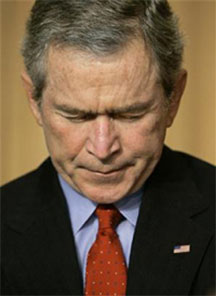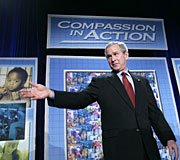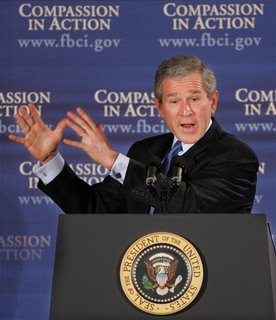GEORGE W. BUSH DELIVERS THE CHRISTIANS UP TO THEIR ENEMIES-- ALL INSIDE HIS SATANIC REGIME
>

Althought I wanted to after writing about it last week, I still haven't read David Kuo's book, Tempting Faith. I'm still reeling from Ron Susskind's brilliant The One Percent Doctrine. But last night I watched David Kuo on TV with Colbert and I almost busted a gut laughing (at Colbert, not Kuo... although he had a decent sense of humor too, now that I think about it). The book, of course, is no laughing matter and today a smart friend of mine at the DSCC who did read it, sent me a cool synopsis. He referred to it as "the lowlights." [My personal fave is Daschle trying to be cooperative with the White House and get a good faith-based bill passed while DeLay, Hastert and the Bush Regime power-mongers were torpedo-ing it.]
Appearances Were More Important than Actual Faith Based Initiatives
Karl Rove: "Just Get Me a F-ing Faith Based Thing. Got it?"
"Three days later, a Tuesday, Karl rove summoned [Don] Willett to his office to announce that the entire faith-based initiative would be rolled out the following Monday. Willett asked just how without a director, or plan the president could do that. Rove looked at him, took a deep breath, and said, 'I don’t know. Just get me a fucking faith based-thing. Got it?’ Willett
was shown the door." [pp. 140-141]
Secretary of Education Margaret Spelling: "Just Get Me a Damn Faith Bill."
"Yet for our House Republican friends, the initiative was primarily useful for politics, and for some of my White House colleagues, the initiative wasn't even on their radar screen… Margaret [Spellings]
listened cheerfully and said, 'David, darlin', you are doing a good job. Great job.' Then, lightly but seriously, 'but David, please. Just get me a damn faith bill. Any bill. I don’t care what kind of bill. Just get me a damn faith bill.'" [p.166]
From the Beginning, Now-White House Chief of Staff Josh Bolton and Senior White House Staff Did Not Consider the Faith Based Office a Priority.
"Even with the speeches and meetings, officials in charge of the Bush transition were ignoring the
faith-based effort. In late December [2000], Josh Bolton, later to become deputy chief of staff for policy head of the Office of Management and Budget, and the White House chief of staff, responded to a pastor's inquiry about the initiative by saying, 'as far as I know, no one is in charge of the undertaking yet.' His disregard was surprising not only because he had been the campaign's top policy guru, but because he had the same role during the transition. As it turned out, it wasn't just
that nobody had been named to shepherd the initiative through the crucial transition period, it was that nobody at the senior levels of the transition team was even paying attention to the problem."
[p.138]
The White House and Congressional Republicans Killed Faith Based Legislation and Funding

Bush Was Directly Responsible for the Faith Based Initiatives' Funding Shortfalls.
"After leaving I learned that all budget decisions were made by three people once a year. President
Bush, Karl Rove, and Andy Card would sit in the Oval Office and the president would go over the big
numbers. Unlike his wonky predecessor, Bush didn't dig down into specific programs. It wasn't his style. He was America's CEO. He wanted to dictate the big picture and leave it to others to implement. That meant that while he may not have known the details of his compassion agenda, he
knew it was languishing and had no problem with that." [p. 257]
Josh Bolton Told Kuo’s Office They Weren't 'Winning Any Friends' By Pushing the Faith Based Bill.
"In October and November we met with Majority Leader Daschle’s staff and with Daschle himself. He had minor objections but we could get past them. We had a bill supported by everyone. All we
needed was a go ahead from Josh Bolton or Andy Card. Bridge [John Bridgeland] pestered them day
after day. Josh finally took him aside. 'Bridge, you aren’t winning any friends here. Just keep it
down.'" [p.196]
White House Told Kuo’s Office That Faith Based Legislation Was Too Expensive.
"Our bill needed nothing more than an 'Okay,' and it would have been done. Senator Santorum tried lobbying the White House and so did Senator Grassley. Still, nothing. It was 'too expensive.' By mid
December as Congress was about to adjourn we had a final chance. Late one evening Daschle's office called and said they could attach the bill to another bill and get it done in hours. Would the White House support it? Bridge [John Bridgeland] went to Nick, Margaret, and Karl one last time.
'Not now, Bridge, not now. Maybe next year.'" [p.196]
Hastert and DeLay Wanted Red Meat Legislation for the Base, Not an Actual Bill.
"We called it the Charity Aid, Recovery. And Empowerment (CARE) Act. In addition to Lieberman and Santorum, Senator Clinton supported it. Max Baucus, Democratic chairman of the Senate Finance Committee supported it. So did Charles Grassley, his Republican counterpart. Unfortunately, a lot of other people didn't like it. DeLay and Hastert's offices didn't like it. We were 'watering down the
employment provisions.' Instead of fighting the divisive battle over hiring, we added provisions
prohibiting the federal government from disallowing faith-based groups to apply for grants just because they displayed religious icons, had religious names or had clergy members on their boards. Our Unlevel Playing Field report showed those were somewhat problematic, or at least as problematic
as hiring rights. Nevertheless, the House staffers actually tried to get some of the conservative Christian groups to oppose it." [p. 195]
White House Words v. White House Actions-- The Heights of Hypocrisy on the Faith Based Initiative
President Bush Broke Promises to Direct Millions to Faith Based Initiatives.
"Billions had been promised-- $8 billion in the first year alone. We were $7,969,000,000 short of that promise. This was halfway through the next year. There should have been $16 billion. All we had managed to get in the federal budget for the Compassion Capital fund was $30 million. The difference had nothing to do with 9/11. It had everything to do with White House indifference,
bipartisan Capitol Hill indifference, and interest group indifference.” [p. 211]
The White House Used Christians and the Faith Based Office "For Their Own Political Ends":
Ø "For years I had wondered what it would be like to work in the White House improving and influencing our culture and politics for Jesus, I thought the enemy was the prevailing anti-God cultural
and political forces, that is, Democrats and secularists. I never thought to worry about Republicans using Christians for their own political ends-- Republicans like me.” [p. 230]
Ø "Now, however, George W. Bush's White House was doing the same thing: it was deceiving the public, and in doing so it was mocking the trust of the American people. More disappointing, it was mocking the millions of faithful Christians who had put their trust and hope in the president and his administration." [p. 253]
On the Faith Based Initiative, President Bush Was All Talk, No Action.
"Within three weeks of the president's grand announcement it became clear the White House wasn't going to fight for mentoring or vouchers any harder than it had fought for compassion programs. It wasn't a big secret. Friends at the Office of Management and Budget let me know that they would
try to get some money for the program but that they couldn't make any promises." [p. 226]
Bush Did a Poor Job of Supporting Faith Based Initiatives.
"He [President Bush] concluded by saying, 'my job is to get the initiative going, is to stay on it, not yield, and then to ask the questions to the people responsible for getting the money out the door, how are we doing.' If that was his job, he had done it very poorly." [ p. 249]
President Bush Broke His Promise to Include Charitable Tax Cuts in his Tax Legislation.
"But something was missing; the president’s promised $6 billion per year in tax credits for groups helping the poor. Those tax credits had been the center piece of compassionate conservative efforts
for years and the centerpiece of the president’s own compassion agenda during the campaign." [p. 161]
White House Officials Express Their True Feelings about Evangelicals

Rove Described Jerry Falwell as Someone "We Have to Put Up With."
"I told Karl about Jerry's behavior at the Memorial Service 'Listen, I don't know. Would you just call Jerry, apologize and make things nice? We just have to put up with him.'" [p. 194]
Senior White House Officials Described Evangelicals as "Nuts" and "Boorish."
"For most of the rest of the White House staff, evangelical leaders were people to be tolerated, not
people who were truly welcomed. No group was more eye-rolling about Christians than the political affairs shop. They know 'the nuts' were politically invaluable, but that was the extent of their usefulness. Sadly, the political affairs folks complained most often and most loudly about how boorish many politically involved Christians were." [p. 229]
Senior White House Officials Also Described Evangelicals as "Ridiculous," "Out of Control," and "Goofy."
"Political Affairs was hardly alone. There wasn't a week that went by that I didn't hear someone in the middle to senior-levels making some comment or another about how annoying the Christians were or how tiresome they were, or how 'handling' them took so much time. National Christian leaders received hugs and smiles in person and then were dismissed behind their backs and described as 'ridiculous’, ‘out of control,' and just plain 'goofy.'" [pp. 229-230]
White House Officials Referred to the Faith Based Initiative as the "F-ing Faith Based Initiative."
"The president had mad great promises but they hadn't been delivered on. Worse than that, the white house (White House?) hadn't tried. Worse than that, we had used people of faith to further our political agenda and hadn't given them anything in return. I went on and on for a few minutes. He [Andy Card] sat there bug-eyed. 'Formality' meetings are supposed to be just that. 'And finally, sir,
this thought. I don't know if you are aware of this, but your staff frequently refers to the faith-based initiative as the 'fucking faith-based initiative,' that doesn't help." [p. 243]
White House Held Conference Calls with Evangelicals to Placate the Religious Right; Their Advice Was Never Taken.
"The calls began with an overview of what the president would be talking about in the coming week.
If necessary, participants were asked to talk to their people about whatever issue was pending. Talking points were distributed and advice was solicited. That advice rarely went much further than the conference call." [p.171]
Faith Based Office or Political Shop?
Karl Rove Chose the Head of the Faith Based Office on His Political Connections to Clergy. "Karl wanted to know how connected Jim [Towey] was to the hierarchy of the American Catholic Church. If he wants the job, Karl told Jeb [Bush], tell him to get 'as many red hats as he knows to
call on his behalf/' 'Red hats' were cardinals, the highest-ranking officials in the Catholic Church beneath the pope, notable for their scarlet caps." [p. 200]
Ken Mehlman Used the Faith Based Office for Political Means; Deliberately Misled the Public on the Nature of Faith Based Roundtables.
"A few days later, Jim and I were sitting with Ken Mehlman, head of Political Affairs. We laid out a plan whereby we would hold 'roundtable events' for threatened incumbents with faith and community leaders. Our office would do the work, using the aura of our White House power to get a diverse
group of faiths and to help poor people in their area. Though the Republican candidate would host the roundtable, it wouldn't be a campaign event. The member of Congress was just taking time away from his or her campaign to serve the community. It would be perfect… Ken loved the idea and gave us our marching orders. There were twenty targets. On the Senate side, priorities included Saxby Chambliss in Georgia, Wayne Allard in Colorado, and Tim Hutchinson in Arkansas. House priorities were Melissa Hart in Pennsylvania, Shelley Capito in West Virginia, Anne Northup in Kentucky and John Shimkus in Illinois. 'This is good, very good, very, very good,' Mehlman said. 'But we want to be careful, too. We can't be requesting the events, we’ll have to have the candidates request them. And it can't come from the campaigns. That would make it look too political. It needs to come from the congressional offices. Well take care of that by having our guys call the office to request the visit.'" [pp. 201-202]
Faith Based Roundtables Were Partisan Events-- Democrats Not Invited.
"Our press shop responded with a statement: 'the bottom line is that Jim [Towey] travels all over the
country to talk about the president's faith-based initiative, and he visits with people regardless of political affiliation. That was true in general. It was certainly not true of the roundtables. Democratic candidates were not invited." [pp. 206-207]



2 Comments:
Hello again DownWT,
Understanding why religion is strong delusion
Christians often quote things like "know them by their fruits," yet after millennia of being duped into abetting blatantly evil scoundrels, many still don't understand the meaning or import of much of what they read. The same canon paradoxically propounds "faith," which means the complete opposite of "know them by their fruits," i.e., to discern the truth by analyzing deeds and results (works) and to weigh actions instead of merely believing what is said.
The deceptive circular logic of posing a fantasy messiah who urges both discernment of the truth and faith (belief without proof) clearly represents a skillful and purposeful effort to impose ignorance and confusion through "strong delusion." Any sage worth his salt could understand the folly of this contradictory so-called wisdom. This and mountains of evidence demonstrate that faith and religion are the opposite of truth and wisdom. It is no wonder charlatans like Rove, Bush, and others have marked Christians as dupes to be milked as long and as hard as possible. Any accomplished con artist easily recognizes religion as the ultimate scam and fervent followers as ready-made marks and dupes.
We now live in an era where science has proven so much about the vastness, rationality, mathematical preciseness, and structural orderliness throughout every level of our 11-dimension universe. Nonetheless, large percentages of people still conclude that these flawed and contradictory religious canons are the unmodified and infallible "word of God." People who can't (or won't) discern the difference between truth and belief are easily misled about the differences between good and evil, wisdom and folly, perfection and error, reason and irrationality, and right and wrong.
The fact that political leaders have always had close relationships with religious leaders while cooperating to manipulate followers to gain wealth and power is overwhelming evidence that the true purpose of religion is deception and delusion. People who are unable to effectively discern basic moral choices or to reason accurately are easily indoctrinated to follow the dictates of national and imperial leaders who wrap themselves in religious pretense. Truth and wisdom are direct threats to the existence and power of empires. That is why imperial leaders always strive to hide so-called secret knowledge and impose deception and ignorance upon their subjects.
What then is the purpose of "faith" but to prevent otherwise good people from seeking to understand truth and wisdom?
Read More...
Here is Wisdom !!
Peace...
Wow - that was quite an exhaustive study of the faith-based efforts - what hypocrites. I just saw Andrew Sullivan on CNN's Jack Cafferty show and he made the same point - Republicans have used evangelicals for political ends and the charade is starting to wear thin.
Post a Comment
<< Home